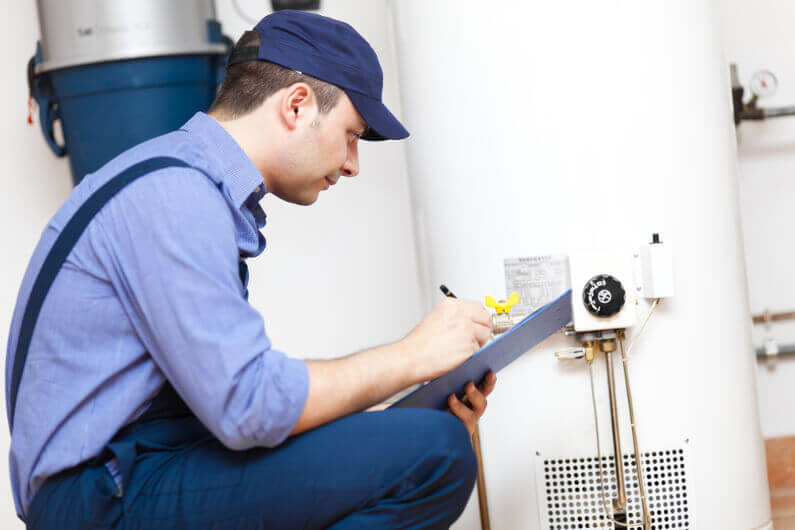We have stumbled on the article involving Early Signs of Water Heater Failure down the page on the net and decided it made perfect sense to discuss it with you on this site.

In some cases, the lag in your heating system is simply a result of showering way too much or doing tons of washing. However, there are circumstances when your tools needs dealing with so you can continue enjoying warm water. Do not wait for busted hot water heater to provide you a large migraine at the optimal of wintertime.
Rather, learn the warning signs that show your water heater gets on its last leg before it entirely collapses. When you discover these 6 red flags, call your plumber to do fixings before your maker totally stops working and also leaks anywhere.
Experiencing Fluctuations in Temperature
Your water heating system has a thermostat, and the water produced should stay around that exact same temperature you set for the unit. If your water ends up being too cool or also hot all of a sudden, it could mean that your water heater thermostat is no longer doing its job.
Producing Insufficient Hot Water
If there is not enough hot water for you and also your family members, yet you have not transformed your intake routines, then that's the indicator that your hot water heater is stopping working. Typically, growing families and an extra shower room suggest that you have to scale up to a larger system to satisfy your demands.
When everything is the same, yet your water heating unit instantly does not satisfy your hot water demands, take into consideration a professional assessment since your machine is not executing to requirement.
Seeing Leaks and also Puddles
When you see a water leak, check to screws, pipes, as well as adapters. You might just require to tighten a few of them. Nonetheless, if you see puddles collected at the bottom of the home heating device, you should ask for an instant inspection since it reveals you've obtained an active leakage that could be an issue with your storage tank itself or the pipes.
Listening To Weird Seems
When uncommon sounds like knocking and touching on your equipment, this suggests debris buildup. It is akin to stratified rocks, which are tough and make a great deal of sound when banging versus metal. If left ignored, these pieces can produce splits on the steel, causing leaks.
The good news is, you can still conserve your water heater by draining it as well as cleansing it. Just be careful since managing this is dangerous, whether it is a gas or electric system. Put on safety glasses, gloves, and safety apparel. Most of all, see to it you know what you're doing. Or else, it is far better to call a professional.
Discovering Gloomy or Odiferous Water
Does your water suddenly have an odor like rotten eggs and also look unclean? If you scent something strange, your water heater could be acting up.
Aging Beyond Standard Lifespan
If your hot water heater is greater than ten years old, you should think about replacing it. That's the natural lifespan of this equipment! With correct upkeep, you can prolong it for a few even more years. On the other hand, without a routine tune-up, the life expectancy can be much shorter. You might think about water heater substitute if you recognize your water heater is old, coupled with the other problems discussed above.
Don't wait for busted water heating units to give you a large headache at the optimal of wintertime.
Your water heater has a thermostat, and also the water created should stay around that very same temperature you establish for the system. If your water becomes too chilly or too warm all of an unexpected, it could indicate that your water heater thermostat is no much longer doing its task. If your water heater is more than 10 years old, you need to consider changing it. You may think about water heater substitute if you know your water heating system is old, combined with the various other problems mentioned over.
Recognizing the Signs of a Damaged Water Heater
Winter may be mostly behind us but having hot water in our homes is a necessity year-round. A broken water heater can be a time-consuming and costly problem.
Recognizing the signs of a water heater in distress, and knowing what to do about it, is the best way to avoid a full-blown water heater "meltdown."
Sediment buildup, rust, and high water pressure are some of the most common causes of water heater failure. Improper installation or equipment sizing are other commonly found issues. A leak can occur near the supply line which can cause damage to dry wall or flooring.
Like any appliance, frequent checks can prevent your water heater from becoming a big problem. Try to set an annual reminder to check for water pooling around your water heater and to tighten any loose fittings you might find. The quicker the issue is resolved, the less damage it will cause in the end.
If you do find signs that your water heater is broken or about to burst, the first thing to do is to shut it off. For gas water heaters, twist the dial at the top of the thermostat from ON to OFF. If it’s an electric heater, switch the circuit breaker to OFF.
Once the water heater is turned off follow these steps:
Turn off the water supply. Completely drain the water heater. Open the pressure relief valve. Rinse the water heater with cold water when the unit has finished draining. https://armstrongcomfort.com/Blog/things-that-can-cause-your-water-heater-to-break

We were made aware of that report on Early Signs of Water Heater Failure through someone on our other web page. Enjoyed reading our write-up? Please share it. Help somebody else check it out. I recognize the value of reading our article about When Should You Replace Your Hot Water Heater?.
Make An Appointment